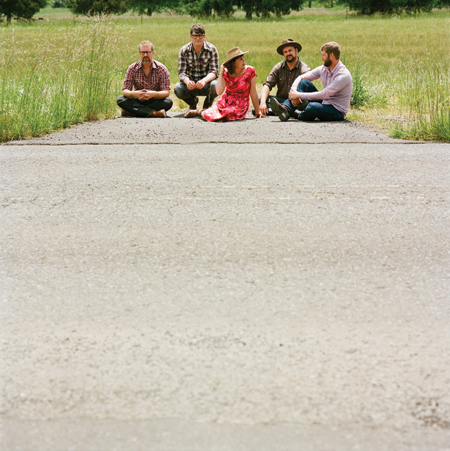Videos by American Songwriter
The music of the Decemberists has been labeled many things – folk, prog, indie rock –but with the band’s new album, The King Is Dead, the goal was to switch things up and embrace more pastoral American influences.
Colin Meloy recently spoke with American Songwriter about the thought process behind The King Is Dead, and what it’s like to write “pretty songs.”
What led to the folky switch on The King is Dead, particularly after the nearly progressive leanings of your last couple of albums?
I don’t know – that kind of folkiness has always been in me. I feel like it crops up on Decemberists records here and there. I guess it’s just a little more concentrated on this record. I guess I was just ready to try something new. I had an inkling to write a bunch of pretty songs and make a record that way.
Gillian Welch is featured on seven tracks. How did you get hooked up with her? I’m guessing you guys really hit it off since she’s featured so much on the album.
She’s a really kind person, both she and Dave [Rawlings, who also provides backing vocals on the album]. We crossed paths. I think we reached out to them years ago, and she and Dave came out to a show we did in Nashville and came on stage – probably three or four years ago – and did some songs, and we spent a couple hours after the show just in the green room, cycling through Robyn Hitchcock songs, passing a guitar back and forth. We became kindred spirits almost immediately, so when [producer] Tucker Martine and I had this idea of getting a female singer with a really distinctive voice to do some of the backing vocals, she was the first that came up, and thankfully, she was willing and able to do it.
One thing that’s really striking about The King Is Dead is how loose the performances sound. Did you guys follow any methods to capture more raw performances?
We tracked some of the stuff live, as much as we could. That said, we did end up having a higher standard for the performances, so we ended up going back and overdubbing some stuff. I think “Down By the Water” and “All Arise!” and some other tracks were done live, just in the barn without any isolation – everybody just sitting in the middle of the room together. That adds a certain atmosphere to the record, for sure.
In addition to trimming away some of the stylistic and instrumental layers, you also trimmed the tracklist down to ten. Did you only have ten songs to work with?
Actually, all told, I’d bet you I had twice as many songs, 16 or 17 of which I brought to the band, and then we whittled it down to ten. Really, from the outset, that was part of the rules. We just wanted it to sit really comfortably on a vinyl LP, side A and side B, and not overstay its welcome. The focus was really “brevity and economy” with this record.
Critics often lump your band into the “prog rock” genre. Are you comfortable with “prog” being a part of your legacy?
Yeah, absolutely! You know, I never really listened to “prog” growing up, and I still only have sort of a passing knowledge of it. I think our little dabbles and forays into prog have been just experiments with the form a little bit, in my viewpoint, and I’ll probably continue to do it. I don’t know what you mean by “prog” – I think people think of prog as this ‘70s behemoth music genre where there’s lots of notes played really quickly. I think that pops up in a few places as sort of a nod to that tradition, but a lot of the stuff that typically gets labeled as “prog” is just sort of longer, more involved narrative songs, which is definitely a trope of prog music. But with the music I listen to, anywhere from Hüsker Dü to Paul Simon, artists have dabbled in that kind of form. And a lot of times, that’s what I’m drawing from. Some stuff like “The Island” off The Crane Wife owes as much to Paul Simon’s “The Late Great Johnny Ace” as it does to anything Gong ever did.













Leave a Reply
Only members can comment. Become a member. Already a member? Log in.